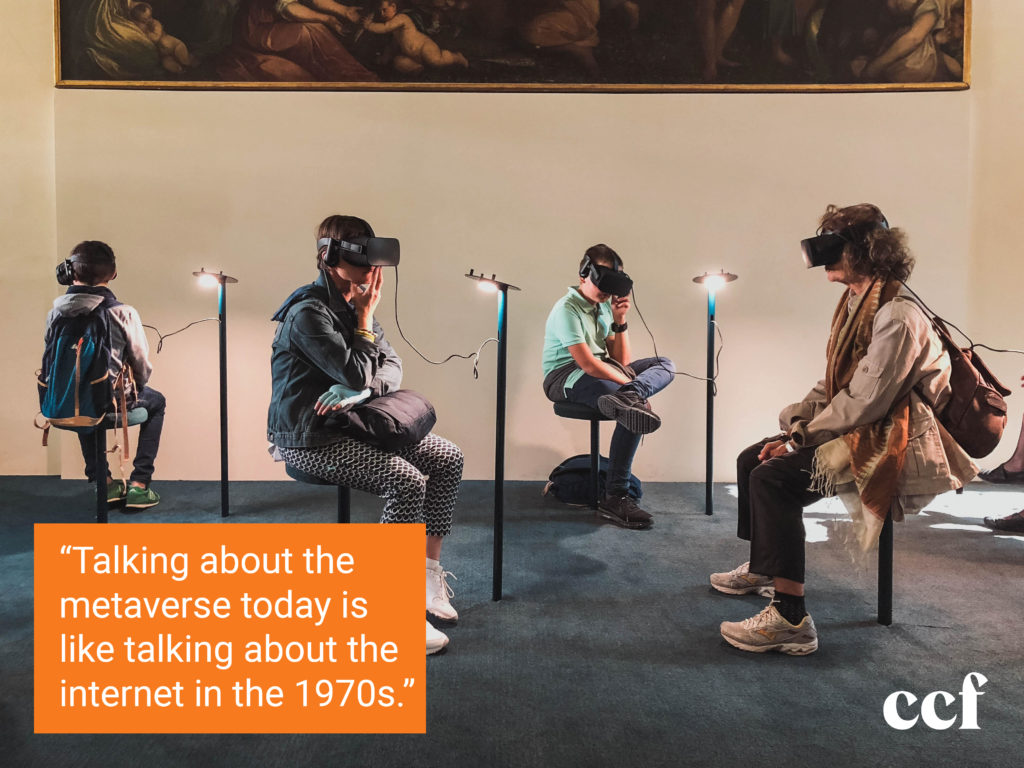This week’s key points:
- The Metaverse is here and it’s here to stay
- The Metaverse is a broad term used to describe VR, AR, and other virtual environments
- Big tech companies are rushing to stake their claims (See: Facebook’s name change to Meta)
Is Ready Player One closer to the present than the future? Why did Facebook change its name to Meta? And what is the Metaverse? There are so many ways to describe this broad concept, so hopefully this article can make it a little less confusing.
WIRED sums it up well, in saying that “talking about what ‘the metaverse’ means is a bit like having a discussion about what “the internet” means if we were in the 1970s. The building blocks of a brand new communication medium were in the process of being built, but no one could really know what the reality would look like.” In other examples, imagine trying to explain social media before it became widely used, or even explaining how a microwave works when those were first invented.

What is the Metaverse?
We would describe the Metaverse as a pathway to combine the digital world with the real world; it’s an umbrella term for virtual reality and augmented reality, where you can play games, shop online, visit a place, or participate in an online community. And you don’t necessarily need a headset to be in the metaverse. It can be through a game console, your phone, or really anywhere you’re connected to the online world. World of Warcraft and Fortnite could already be considered as a metaverse. As with any new universe, the opportunities that arise are endless here. And that’s why tech giant executives like Facebook’s Mark Zuckerberg want to own and be the biggest stakeholders in this space as our tangible world collides with the digital world. This is more than a media opportunity. The metaverse is going to have an effect on the entire economy. In as soon as 10 years, there may be two main types of wealth: virtual and real.
From WIRED:
“It also translates to a digital economy, where users can create, buy, and sell goods. And, in the more idealistic visions of the metaverse, it’s interoperable, allowing you to take virtual items like clothes or cars from one platform to another. In the real world, you can buy a shirt from the mall and then wear it to a movie theater. Right now, most platforms have virtual identities, avatars, and inventories that are tied to just one platform, but a metaverse might allow you to create a persona that you can take everywhere as easily as you can copy your profile picture from one social network to another.”
How will it affect me?
The metaverse will certainly change how business is done across the board. Still, there are hundreds of unanswered questions. Will we all be wearing VR headsets? When will that equipment be affordable for the masses? Will we exist holographically as we watch a real concert? So many artistic ideas are being discussed, but what’s behind the engineering of the metaverse? And you’ve heard of NFTs right? They tie right into the metaverse, which may be a place to actually show them off.
Despite the concerns, the metaverse is our future, and will be in your life from here on out. Predictably, keeping an eye on this concept will be important for us marketers. New ways to engage audiences will inevitably change the way we reach them. That could include sponsoring virtual showrooms, hosting events, purchasing banner ads in a virtual environment, or even creating your own virtual community. The opportunities could be endless!
You know your business, we know emerging media platforms. Let’s talk.
Thanks for reading, and we’ll see you for the next installment of Media Trends Monday! Have a great week.



